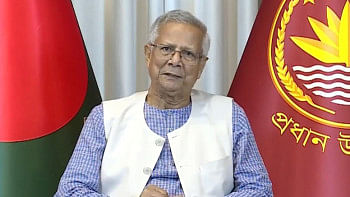The world that Yunus would build
In a world which often bemoans the paucity of visionaries in our times, Muhammad Yunus comes across as one who can and does peer into the future. In his recent address to the Indian parliament, which has demonstrated its unqualified respect for him by inviting him to speak before it, the Nobel laureate has spelt out his vision of the future in what is clearly a bold and unambiguous manner. The boldness stems from his projection of a South Asian Union by 2030. On the face of it, and given the trend toward political unity in such regions as Europe and South East Asia, there is little that could be considered new in Yunus' suggestions. And yet for a region which remains stymied by crises of a multifaceted sort (think of all the bilateral and other issues which have held up regional cooperation for years), Yunus' vision of a single, purposeful South Asia is an expression of the courage one expects men of vision to demonstrate before the multitudes.
Beyond the courage factor, Professor Yunus' thoughts on a unified South Asia make sense for a whole range of reasons. There is little question that in the years immediately ahead, South Asia, without infringing on the sovereignty of its constituent states, will be in need of common domestic and global policies if it is to have any impact on the rest of the world. However, as Yunus has pointed out (and one cannot but agree with him), those policies must have the individual at the centre of things. The vision of self-enterprise, through provision of easy access to financial services to every person that the Nobel laureate has focused on, should be seen as the fulcrum on which individual and in turn social growth can define lives in the region. For far too long, the individual in South Asia has been dependent on handouts to eke out a bare existence. The time has now come for him to branch out of such a condition. He can do that if governments in South Asia are ready and willing to go the necessary lengths to allow him to make that leap from mere survival to dynamic individuality. Charity, as Yunus tells us, will need to be converted to social business if every citizen of South Asia is to feel that he is an integral part of and not an incidental existence in the development process.
Muhammad Yunus has given the nations of South Asia a plateful of thoughts to mull upon. His vision of the region being the first poverty-free part of the globe indeed exercises our imagination. So do his thoughts on the creation of a state-of-the-art health care system for the people of South Asia. With Saarc already at work, Yunus' ideas should come in as a substantive buttressing of the whole idea of regional cooperation in our part of the world.

 For all latest news, follow The Daily Star's Google News channel.
For all latest news, follow The Daily Star's Google News channel. 



Comments